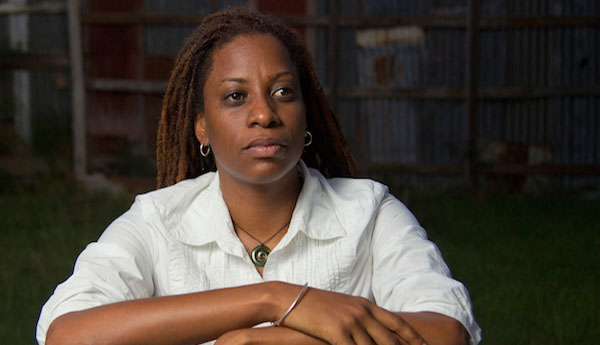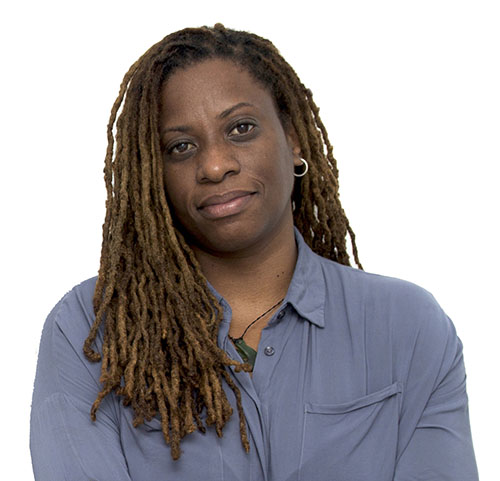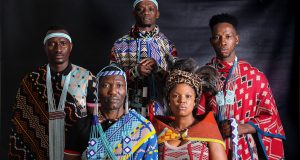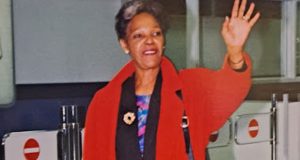By Neil Armstrong
PRIDE Contributing Writer
TORONTO, Ontario — An award-winning Caribbean filmmaker, who feels like she stumbled onto something that is becoming her life’s mission, will be in Toronto next week to showcase her short film and the resulting project it demanded.
Barbadian Lisa Harewood’s film, “Auntie,” about migration has stimulated so much feedback that she has created the Barrel Stories Project — an online initiative which is sharing oral histories of migration’s lesser-known impact on the people left behind in the Caribbean.
Harewood will visit Toronto from June 21- 30 to premiere the film, created in 2013, and to introduce the project, which was launched in Barbados in April 2015.
While here, Harewood wants to interview parents and children who were separated due to migration, as well as the caregivers who stepped in to temporarily look after those children.
Two free film screenings and information sessions are planned for June 23 at Oakwood Village Library and June 25 at Cedarbrae Library, both starting at 7 p.m. The filmmaker will show her 16-minute film, play excerpts from Barrel Stories interviews and lead a discussion on the issue.
“Auntie” is her debut effort as a writer and director. The script was one of five selected for development by Commonwealth Writers out of over 900 submissions from 54 countries.
The film, a fictional narrative which looks at the effects of migration on children and caregivers left behind, has screened at festivals, universities and conferences in several countries, including New Zealand, Cuba, France, USA, China and the UK.
It tells the story of the bond between a child and caregiver, which is disrupted when the child is sent for by her/his mother living overseas.
Viewers expressed surprise at the portrayal of a common, but rarely discussed, aspect of Caribbean family life and many reached out privately to reveal their own unique experiences to the filmmaker.
As part of the film’s outreach, she decided to create a platform to formally record and share those experiences.
Harewood is not a child of immigrants, but was co-parented by her grandmother and aunt, whom she lived with for the first six years of her life because her mother was a single mom and worked long hours.
That separation still had an impact on her life even though she moved in with her mother and saw her relatively regularly.
“And I went to private school with kids whose parents were overseas and who had that whole thing of always saying ‘I’ll be going at some point soon’ and then years go by and they’re still there, and you’re always positing over why is this. So it’s always been kind of there but I think, like most Caribbean people, you kind of take it for granted that it’s just another kind of Caribbean family structure that we have. It didn’t seem particularly remarkable at that time,” says Harewood on the telephone from her home in Barbados.
In 2004, Paulette Ramsay, a mentor and tutor of Harewood from the University of the West Indies, wrote a novella, “Aunt Jen,” about a little girl who is trying to know her mother who she has never met and who lives overseas.
“That book completely had me in tears,” she says, noting it moved and inspired her to look at the issue.
Harewood said there was only one film with Leonie Forbes, “Milk and Honey,” released in 1988, about a mother working in Toronto as a nanny whose son comes to visit and she won’t let him go back to Jamaica because she realizes that their relationship is disappearing.
“But there wasn’t anything on this and talking about how migration affects people who remain here, but have to kind of make up for the missing person,” she added.
The opportunity to tell this story came when the Commonwealth Writers had a competition and the only parameters were that participants had to tell an intergenerational love story.
“I thought this is perfect for talking about this thing that I know so much about but it looks like I would never get to do in a feature-length film. So, that’s what I did and had no idea that the reaction to it would be so strong that, three years later, it’s now become almost a life’s mission,” Harewood revealed.
Having never written anything of this nature before, she was completely shocked, because the only writing she had done was in advertising.
Up until this point she identified herself as a producer and this was her first attempt to write something.
Harewood decided two days before the deadline, to submit it and made the first shortlist of 20 people.
“I was in shock because I didn’t have nearly as much of a script written as they thought I did, so I then had to kind of scramble and write it. I think the first thing I submitted to them was 8 pages, the final thing ended up being 16 or 20 pages.”
Initially she wanted to bring someone onboard to direct it, but the Commonwealth Writers told her that she had sketched out something that they think is really compelling and they were looking for people who had not gotten a writing or directing credit before to develop.
“It was frightening, actually, because it was a lot of trust being placed in me to deliver a film when I hadn’t actually done one as a director before. But I came to realize that I had a story to tell that other people didn’t seem to plan to tell and that I was just going to be one person making that chance to tell it. It didn’t have to be definitive of anything. I just had to tell the story that I want to tell as best as I can and that would be fine – that would be good enough.”
Harewood said “Auntie” was launched in New Zealand and there were people from the large immigrant population of Samoa and Papua New Guinea who came up to her and told her that this was their story too.
‘They may use different terms – they don’t have barrels necessarily – but they come from large families and they usually have to migrate in stages, just like we do, and it causes all sorts of weird dynamics. So that was my first inkling that ok, I’m on to something that’s bigger than what I thought.
“And then once the film actually started being shown within the Caribbean or to Caribbean diaspora communities, I was inundated with Facebook messages and phone calls and emails from people saying: 1) we never thought we’d see this part of the migration situation portrayed on screen; 2) I didn’t realize I was a barrel child until I watched your film. A lot of people said that cause it’s so normal for us to kind of deal with migration in this way.”
A social worker in New York sent Harewood a card with $20US to do whatever she wanted to do with it, noting that she was doing her masters in social work, had to come up with a major paper topic, and after seeing the film, decided she was going to do something on barrel children.
The social worker is Barbadian and lives in Brooklyn where a lot of the children in foster care are Caribbean children, who came up to be reunited with parents but it didn’t work out so they were handed over to the state.
This shocked Harewood and she thought about what to do with all these stories.
At first, if she were doing a screening of the film she would tell these anecdotes during the Q&A and people would respond to the anecdotes as much as they did to the film.
“I felt nobody is going to know about just how vast this issue is and how many people are affected and how unique every story is if I’m just telling anecdotes that only the people in the room can hear. So I thought, well, let me try and see how else I can share these additional stories.
“And after we’ve had the initial run of the film, Commonwealth then came back to all the filmmakers of the program and said come up with an outreach plan for your films. I think everybody else, and initially I did too, thought of ways to kind of show the film to more people in more places. And then I thought I want to do something more than that and so I created Barrel Stories Project as my outreach for the film and it’s now, to my mind, it has eclipsed the film, for me, in some ways already.”
The film has been available online for three years now and anybody can watch it, but she thinks that “it’s the discussion that it provokes afterwards and what that discussion can then lead to, which is more collection and more sharing of these stories.”
Harewood says the Barrel Stories Project is the focal point of all her efforts and has an infinite number of ways that it can be developed and shared.
Regarding the screening in China, she said internal migration has caused about 50 million children to live without their parents.
“It’s one of the biggest crises in the world when it comes to migration — in the same country but they’re seeing their children once a year during the new year holiday. There’s a Canadian-Chinese documentary that has been made about that, that I saw after I made Barrel Stories that really just blew me away, called “Last Train Home,” and it’s about that same thing. It’s about that disintegration of the relationship between the parent and the child because they just don’t understand why their parents can’t live with them.”
Toronto playwright, Trey Anthony, recently presented her play, “How Black Mothers Say I Love You,” which also examined the impact of migration on familial relationships.
Referencing the academic research on this subject, Harewood says there is a quote from Jamaican sociologist, Claudette Crawford-Brown, who actually came up with the term “barrel child,” that has stuck in her memory.
“The grief a child feels at having a migrated parent is greater than the grief of a child who loses a parent to death because it’s open ended. If you’re a child and your parent dies, you’re told and you eventually come to understand that you’ll never see them again. It’s closed; you just have to deal with the grief now they’re absent. With the child whose parent goes, you’re told you’ll be with me soon and quite often that bar keeps moving, that soon keeps getting further and further away and children start to mistrust what’s being told to them. They don’t trust their parents anymore, they think they’re being lied to cause they don’t understand things like visa applications and parents don’t necessarily explain how it works. They often make it seem like I’m going to go and then as soon as I’m ready or I can, I’m going to send for you but they don’t say what gets in the way of doing that.”
Harewood has about 25 stories for the project, however, there are nine on the website, www.barrelstories.org, because she is the only person recording and editing them.
There are about 15 minutes maximum of recordings on the site but, in most cases, Harewood is dealing with two hours or three hours of interview material.
If people want, she lets them have the original unedited recording to keep, and she edits the most salient points for the website.
Anyone in Toronto who is interested in being interviewed for the project can make appointments by coming to one of the events or sending an email to submit@barrelstories.org.
All interviews are done privately and only voices are recorded. Contributors can provide photos to accompany their recording when it is published online or they can choose to remain anonymous.
Based on the initial apprehension she found locally when she started the project, Harewood made a strategic decision to go out to the diaspora first, where she thought people might be a bit more open to sharing thoughts and feelings.
Having done that, she will now take the project to more Caribbean islands – especially Jamaica where the term “barrel children” originated, compared to other countries that might not know it — where she will have interview examples to play for local people.
“Auntie” and the Barrel Stories Project are supported by Commonwealth Writers, the cultural initiative of the Commonwealth Foundation.
Since she made the film there have been a few more — one from Guadeloupe and two from Guyana – and she wants to create a resource hub around this issue.
Harewood previously produced the award-winning feature film, “A Hand Full of Dirt,” nominated for Best First Feature Narrative Director at the Pan-African Film Festival in Los Angeles in 2011 and winner of the Audience Award at Reelworld Film Festival in Toronto that same year.
In 2012, she was chosen as a Reelworld Foundation Emerging 20 Filmmaker, the only non-Canadian named to the list.
Harewood recently started shooting a Barbadian transgender documentary and she hopes to do something related to her other passion – music.
“There was a certain period of time in Barbados and in the Caribbean where we had just this amazing explosion of local music and musicians. I’m a big fan of that era and I’m a big fan of this music that came out during that period and a lot of these guys are getting older and they’re totally celebrated outside the Caribbean. They can go to France or the UK and get mobbed and they can walk the streets in Barbados and nobody would know who they are.”
She has shot a few interviews for that documentary but acknowledged that the difficulty is in the cost of music rights and even just clearing rights because nobody knows who owns what.
“It’s always an undertaking that you kind of step into with a lot of apprehension, but I really want to find a way to kind of immortalize these guys, who I feel just made music that clearly had the ability to appeal to an international audience, long before the Rihannas or anybody else, but we’ve kind of ignored them.”
Another upcoming project is a feature film that she is co-producing with Canadian writer/director, Dawn Wilkinson, called “Revealing Rachel.”
It’s about a bi-racial 19-year-old woman born of a Barbadian father and a Jewish-Canadian mother who goes on a journey to the island in search of her identity.
They have been working on developing the story for a few years and are about to begin the fundraising stage.
She hopes to develop Barrel Stories eventually into an immersive documentary experience online.
Harewood said this is something that the National Film Board of Canada has been doing for over a decade – “building these stories online around subjects that are too complicated to tell within a film format and that’s what I’m trying to emulate.”
She said she is in year one of what will probably be five years of work on Barrel Stories to create something that allows the user to participate, then sit and listen to it.
“I feel like I’ve been really lucky because I’ve kind of stumbled into their competition and then I stumbled into this subject and now it feels like something that I’ll be doing for the rest of my life, to be honest,” she says about her relationship with the Commonwealth Writers and her project.
She says she appreciates the moral support that the organization has given to her and its enduring cheerleading of her work.
 Pride News Canada's Leader In African Canadian & Caribbean News, Views & Lifestyle
Pride News Canada's Leader In African Canadian & Caribbean News, Views & Lifestyle






